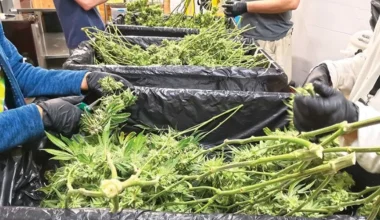Rumors that a second marijuana multistate operator is planning to exit Connecticut are raising questions about the state’s strict regulations and expensive licensing fees.
Meanwhile, despite having made other consolidation moves across the country, Ayr Wellness is shrugging off talk that it’s seeking to sell off a license it acquired in the limited-license state only last year.
Erin Gorman Kirk, the state’s cannabis ombudsman, reiterated her earlier statements to CT News Junkie and the Connecticut East This Week podcast that the company is planning to shop its permit – following the lead of Acreage Holdings, another publicly traded MSO that recently sold off stores in Connecticut.
Ayr spokesperson Rob Vanisko directed MJBizDaily to a statement provided to other media in which the Miami-based company said it remains “operational” in Connecticut.
The company runs a single marijuana store in Manchester, a town to the east of Hartford, which it operates in partnership with a social equity license holder.
The situation represents another complication for Ayr, which is selling off retail licenses in Illinois amid a debt crisis and a reported operating loss of $133. million in the fourth quarter of 2024.
The company announced on June 13 that it would not submit quarterly earnings on time “primarily due to … ongoing negotiations with its creditors.”
Ayr is one of several MSOs with massive liabilities coming due over the next 18 months.
In Ayr’s case, it has $358 million in loans maturing in 2026, according to filings.
Ayr ‘making concerted effort to consolidate,’ exec says
Connecticut appears to be one of Ayr’s least important markets – and, possibly, the one it could most afford to divest.
Seventy percent of Ayr’s retail operations are in Florida, where the company is opening a new cultivation facility later this year.
During a March earnings call, Ayr President George DeNardo listed Ayr’s “core markets” as Massachusetts, New Jersey, Nevada, Ohio and Pennsylvania in addition to Florida.
Earlier this year, Ayr signed a letter of intent to sell off its four stores in Illinois, which DeNardo described as a “market where we do not have the necessary scale to compete over the long term and where we lack vertical integration.”
Ayr is also “making a concerted effort to consolidate” efforts in other states, he said.
The company closed manufacturing and cultivation facilities in Nevada and sublet a facility in Massachusetts, noted DeNardo, who hinted that other moves were imminent.
“We’re taking a hard look at other markets to make sure we are prioritizing those core markets that will deliver for our business,” he added.
Where talk of Ayr’s Connecticut departure started
Kirk first told podcast Connecticut East This Week that Ayr was planning to follow New York-headquartered Acreage, which is selling off three Connecticut stores it operated in the state as The Botanist brand.
“Ayr Wellness has also decided to leave the state, which is heartbreaking because they were backing a person who I thought had incredible ideas for servicing women in this market,” she said.
“I’m crushed about that.”
She was referencing Tiana Hercules, a social equity license holder who is partnered with Ayr.
Kirk noted in the podcast interview, which posted June 11, that Ayr is “staying in other states around us. That tells me they either feel like we are overregulated, or we have too many restrictions.”
In a phone interview with MJBizDaily, Kirk said a broker whom she declined to identify alerted her several weeks ago that Ayr was testing the waters for a sale.
“This concerns me as a patient advocate,” said Kirk, an attorney just finishing her first year as an official advocate for medical cannabis patients in Connecticut.
“I would love to be proven wrong.”
Subscribe to the MJBiz Factbook
Exclusive industry data and analysis to help you make informed business decisions and avoid costly missteps. All the facts, none of the hype.
What you will get:
- Monthly and quarterly updates, with new data & insights
- Financial forecasts + capital investment trends
- State-by-state guide to regulations, taxes & market opportunities
- Annual survey of cannabis businesses
- Consumer insights
- And more!
Ayr exit would have social equity complications
Under Connecticut law, out-of-state marijuana companies can more easily and more cheaply enter the market and expand if they partner with a qualified social equity applicant.
According to business records, Ayr has partnered in retail and cultivation operations with Hercules, an attorney and former Hartford City Council member.
Any exit by Ayr would raise questions about the future of Hercules’ cannabis business.
MJBizDaily efforts to reach Hercules were unsuccessful.
Many cannabis operators consider Connecticut – a vertically integrated market dominated by MSOs with few small businesses and high license fees – to have some of the country’s most challenging regulations.
The application fee for a cultivation license, for example, is $3 million.
And the state strictly limits business operations in ways not seen in other states, such as forbidding certain strain names.
Bureaucratic struggles also have hampered the market:
- Slow license-approval processes led to Connecticut having only 13 operational businesses when its adult-use market launched in 2022.
- Last year, a state investigation found the Connecticut Social Equity Council – the agency responsible for processing social equity applications – to be dysfunctional and leaderless.
- Earlier this year, officials apologized for a surprise inspection at a commercial cannabis testing laboratory that appeared to be retaliatory.
Chris Roberts can be reached at chris.roberts@mjbizdaily.com.
Medical Disclaimer:
The information provided in these blog posts is intended for general informational and educational purposes only. It is not a substitute for professional medical advice, diagnosis, or treatment. Always seek the advice of your physician or other qualified healthcare provider with any questions you may have regarding a medical condition. The use of any information provided in these blog posts is solely at your own risk. The authors and the website do not recommend or endorse any specific products, treatments, or procedures mentioned. Reliance on any information in these blog posts is solely at your own discretion.






